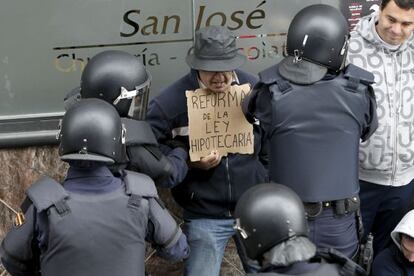Banks have turned courts into "collection offices," say judges
Associations call for changes to be made to laws covering evictions


Judges and prosecutors have this week condemned the "speculative movements" of banks and savings banks when dealing with mortgage defaults, given that there is evidence that they are intentionally delaying the auction of properties that precede evictions, in the hope the price will go up.
Four associations of judges and three associations of prosecutors warned on Tuesday that they will relegate matters brought to them by banks - among them evictions, which are causing massive backlogs in the courts - unless they are given adequate means to deal with them. "Banks have turned the courts into their collection offices," says the spokesperson for the Professional Association for the Magistracy (APM).
The associations of judges and prosecutors accuse the banks of "overloading" the courts after "acting negligently in high-risk financial operations," according to Joaquim Bosch, the spokesperson from the progressive group Judges for Democracy.
As well as clogging the courts with a "spectacular" number of evictions, banks and savings banks "have, on occasion, paralyzed executions, with the hope of getting a better price for properties that are currently in repossession," says the APM spokesperson, María Teresa Sáez. With the government's creation of the so-called bad bank, Sáez explains, they are expecting an avalanche of reactivated eviction orders, in order to offload the properties to the new lender.
Cases brought by ordinary citizens are being overlooked, the associations say
Magistrates and prosecutors consider the cases that banks are taking to court to be particularly complex, given that, according to Bosch, "they include clauses that are sometimes abusive, and as such, null and void, as well as contracts of adhesion that are questionable. In a context of a legal system that is "seriously overloaded," cases brought by ordinary citizens are being overlooked, the associations say, meaning it would be convenient to establish an "order of priority."
The threat of not giving priority to cases brought by banks "is not a rhetorical one," according to Bosch. But it is yet to be approved by judges. What they are planning to do from this Friday onward is "self-regulation," limiting the number of cases they deal with of this type according to the guidelines established by the CGPJ legal watchdog. As such, the two mercantile courts in Zaragoza, which have received more than 200 such cases this year, would be limited to dealing with just 20, as is stipulated by the CGPJ.
APM spokesperson María Teresa Saéz says she supports a recent study produced by seven judges, which focuses on the abuses in the current system of evictions. Calling it "brave" and "reflecting reality," Sáez says she backs calls for the regulation of a system whereby homeowners who default on their mortgage should be left free of debt when they hand over the keys to the property.
"Reforms to the mortgage law are extremely urgent," she says. "Recommendations aren't enough."
The association believes the option of handing over the keys and thus canceling the debt should benefit people who bought their property as a place to live, rather than those who purchased the property for speculative purposes.
Government to seek pact with lenders to ease eviction rate
In the wake of an unprecedented deluge of evictions in Spain, the government is to study a pact with the banks to ease the pressure on householders who are unable to meet their mortgage payments. Socialist leader Alfredo Pérez Rubalcaba told Congress: "Spain's banks are receiving money from the European Central Bank at 0-percent interest and with a grace period of three years. Do you consider it impossible to convince the banks to offer similar treatment to people who are having trouble paying their mortgages?"
"We are witnessing truly dramatic events," Prime Minister Mariano Rajoy responded. "We have adopted measures; we are studying the effects of these and we do not rule out adopting more in this matter. We are very attentive of the proposals you have made."
The proposed pact will not bring about any legal reforms but the government's Good Practice Agreement, which the banks voluntarily adopted to six months ago, will be updated. The main areas to be worked upon include more flexibility in the banks' execution of evictions and the application of dation in payment. The agreement now obliges banks to lower mortgage rates for the unemployed and to allow people to remain in a property for two years as tenants after an eviction order.
"In times such as these, society cannot simply listen to politicians talking about rescuing banks," said CiU spokesman Antoni Duran Lleida. "We have to rescue people, because they're having a harder time than the banks."
Tu suscripción se está usando en otro dispositivo
¿Quieres añadir otro usuario a tu suscripción?
Si continúas leyendo en este dispositivo, no se podrá leer en el otro.
FlechaTu suscripción se está usando en otro dispositivo y solo puedes acceder a EL PAÍS desde un dispositivo a la vez.
Si quieres compartir tu cuenta, cambia tu suscripción a la modalidad Premium, así podrás añadir otro usuario. Cada uno accederá con su propia cuenta de email, lo que os permitirá personalizar vuestra experiencia en EL PAÍS.
¿Tienes una suscripción de empresa? Accede aquí para contratar más cuentas.
En el caso de no saber quién está usando tu cuenta, te recomendamos cambiar tu contraseña aquí.
Si decides continuar compartiendo tu cuenta, este mensaje se mostrará en tu dispositivo y en el de la otra persona que está usando tu cuenta de forma indefinida, afectando a tu experiencia de lectura. Puedes consultar aquí los términos y condiciones de la suscripción digital.








































